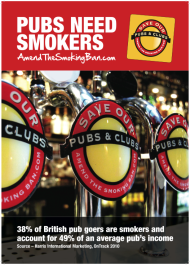
The Conservative party's Social Justice Policy Group will tomorrow publish a 200,000-word report, commissioned by David Cameron (above) and written by former party leader Iain Duncan-Smith.
Weekend reports say that in order to tackle Britain's "binge drinking culture" IDS will recommend increasing tax on alcohol, adding 7p on the price of a pint of beer and 20p on a bottle of wine (ie 4p a glass).
Now, I don't pretend to know much Britain's "binge drinking culture" (other than the fact that I am one of those who undoubtedly consume more than the "recommended" units of alcohol each week), but I do know that politicians whose knee-jerk response to any 'problem' is to tax and legislate must be challenged. If - after rigorous debate - they can justify their actions, fine, but there has to be a full and open discussion that is not dominated by "experts", campaigners and woolly thinking paternalists.
Worryingly, a reader of this blog reports that when he wrote to David Cameron about the smoking ban he received the following response:
Dear Martin,
The Government's ban on smoking in public places has now come into force. Whatever one's own views, it is very clear that public opinion has demanded a ban on smoking in public places for some time. There is also a considerable body of scientific evidence to point to the harmful health effects of second-hand smoke.
While the smoking ban certainly does place restrictions on where people can smoke, it does not ban what is still a lawful activity and people are free to smoke in their own homes and outdoors where the impact of their smoke on others will be minimal. The Government has now published five sets of regulations which set out the detail of smokefree legislation. You can view these within the policy and guidance section of the Department of Health website.
They are all currently being considered by Parliament, where we have raised some reservations, for example about smoking in vehicles, prisons and mental health units. Nevertheless we hope that the Bill and its regulations will play a positive role in reducing exposure to second-hand smoke and, in turn, help to improve public health.
It is clear that we need to tackle smoking, just as we need to tackle the other causes of ill-health. Without action, what should be preventable ill-health in its various forms will cost the country an extra £30 billion a year by the 2020s.
It is important to remember that we're all in this together - individuals, families, communities, and Government, as well as employers, have a social responsibility to ensure that we do not place unnecessary pressures on our stretched NHS services in the years to come. Of course, employers will have to come to their own decisions about whether it is worth their while to provide stop smoking support.
While stop smoking advice at work is a matter for employers, we can say what a future Conservative Government would do. Three-quarters of NHS bodies are currently cutting their 'stop smoking' budgets as a result of the NHS financial crisis, so we would ring-fence these budgets to ensure that they are used for what they were intended: helping people to stop smoking.
The author of this letter is someone called 'Alice Sheffield' but, as Martin points out, "It could just as easily have been penned by the icy fingers of the sadly departed Patricia Hewitt herself." Forest will be writing to David Cameron, taking issue with many of the points in Alice Sheffield's letter. I strongly suggest that others do too.
 Monday, March 8, 2010
Monday, March 8, 2010  Simon Clark
Simon Clark
 Simon Clark
Simon Clark
 TV and Radio,
TV and Radio,  Taxation
Taxation 












